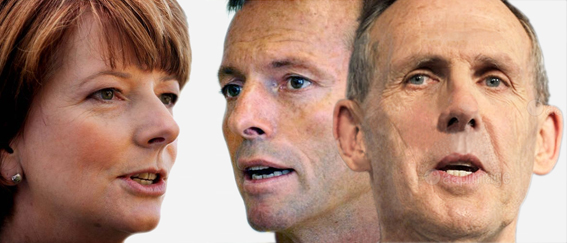The major parties have departed the scene when it comes to action on climate in this 2010 federal election. Their policies are next to worthless in the absence of an effective carbon pricing scheme. [10 August 2010 | Peter Boyer]
The neat, purposeful television and newspaper images of Julia Gillard and Tony Abbott in campaign mode hide a reality that I find scary: neither of them has a coherent plan to address the threat from global warming.

The Greens lead the pack on climate policy in an election debate where leadership and direction are notably absent.
An emissions trading scheme has long been the centrepiece of Labor’s climate policy. Kevin Rudd’s April statement (too vague to be called a decision) that the scheme would be postponed until 2013 was a sign that the government, as Gillard said, had lost its way.
In a bid to regain some lost ground, Labor is promising to oblige coal-power generators to reduce emissions, reward industry for cutting emissions ahead of an ETS, set mandatory emissions standards for new light motor vehicles, subsidise people to replace “clunkers” with fuel-efficient new cars, and allow a business tax deduction for “greening” of commercial buildings.
Some of these initiatives have merit — except that they all fly in the face of the maxim, repeated often by Rudd, Gillard and Climate Change Minister Penny Wong, that all such regulatory measures are too expensive in the absence of an over-arching carbon pricing scheme.
On that point, after years of public discussions Gillard plans to seek consensus from a “citizens’ assembly” informed by a climate change commission. But consensus on such a big, complex policy issue, even if it were possible, is a poor substitute for clear, cogent, authentic statements from the top. From here, this looks like a failure of leadership.
The Coalition contrasts its “direct action” approach with Labor “big-tax” ETS, including some good ideas to support biochar production to replenish soil carbon. But with emissions trading shelved it’s hard to put much light between the parties. Abbott will deny this, but like Labor, the Coalition will be relying on trusty old hand-outs and regulation to do the job.
The Liberal policy says further direct action incentives “may include forestry, energy efficiency, recycling and other measures as required”. That’s “may”, not “will”. Abbott’s promised “action” already looks like an excuse for inaction.
The Coalition undertakes to help fund community take-up of green energy, boost roll-out of renewable power projects, investigate the potential for high-voltage DC transmission and for algal synthesis and biofuels, and plant 20 million trees in public spaces. All worthy initiatives, but costly and ineffectual in the absence of carbon pricing.
While both leaders are confused about how to tackle the climate problem, and neither seems aware of the tight time scale imposed by burgeoning world emissions, Gillard at least acknowledges that this is a major policy issue. Abbott clearly continues to believe that it’s not a problem.
He has taken his cue from a subtext of the Australian climate debate, surfacing every so often in news interviews, talk-back radio and newspaper opinion pieces, which looks to build doubt about the powerful evidence that our 10,000-year stable climate is threatened by man-made warming.
The fact that this isn’t a particularly organised campaign was apparent in a recent “Watts Up with the Climate” presentation in Hobart. Around 100 good citizens were told that temperatures aren’t rising, or if they are that this has little or nothing to do with human activity.
There wasn’t a lot of scientific information in the presentation, but its message wasn’t so much scientific as therapeutic — reassurance that our fears are groundless, that everything is all right and that we should relax about our future.
Feeling positive about the future is good, but only so long as it’s realistic. We should be concerned about man-made climate change, but we’ll feel a lot better if, rather than sit back in fear, we use that concern as a springboard for action.
Applied to climate policy, the major parties’ campaign themes (“action” and “moving forward”) would be laughable if this wasn’t so serious. They continue the time-worn, patronising ritual of assuring us that we can relax in their hands. The evidence says otherwise.
The Greens stand head and shoulders above the major parties on sustainability and climate action, emphasising the need for tough, collective effort to improve energy-efficiency and cut emissions and not shying away from early introduction of carbon pricing. But I suspect some of their direct action ideas need a rigorous physical and economic reality check.
In North America and Australia where per capita carbon emissions are top of the heap, political leaders are losing ground in the battle to develop coherent, effective climate policy.
Late last month, when US Democrat leaders John Kerry and Harry Reid announced they were abandoning climate change legislation after it failed to get bipartisan support, their image was splashed across the international media. They look utterly defeated.
The truth is, the problem is bigger than every political manifesto. Gillard and Abbott continue to behave as if they can manage this problem, apparently in the belief that to admit to the truth is a sign of weakness. The reverse is true.
Here’s my two bob’s worth. Being realistic about climate change, acknowledging government limitations and pushing the “tough love” solution —significant investment and hard work by everyone to build community and national resilience — can win elections. Any less is unacceptable.
• Climate change policy will be the focus of the 2010 Walk Against Warming next Sunday at 12 noon. In Hobart, gather at Parliament House lawns; in Launceston at the Civic Square. Further information: http://www.et.org.au/campaign/walk-against-warming-tasmania-2010
